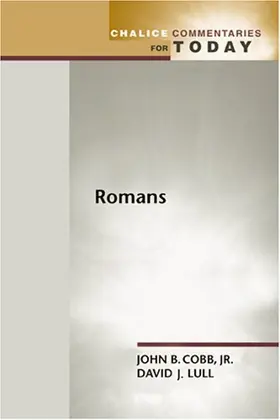

Romans
in Chalice Commentaries for Today
Pages
212 pages
Publisher
Chalice Press
Published
10/1/2005
ISBN-13
9780827205291
Cobb and Lull provide a fresh look at the book of Romans, unique from other interpretations in three ways. First, they interpret Romans as concerned with community salvation rather than focused on individual salvation. Second, they see its theme as God’s righteousness stemming from Jesus’ faithfulness, not individual beliefs. And third, Cobb and Lull approach the book of Romans more theologically than exegetically. They seek the function of the theological findings for Paul’s day and for ours.
The authors take the position that Paul’s teachings have been misrepresented, particularly his thoughts regarding patterns of morality, especially those focused on homosexual acts and the subordination of women to men. They claim that when Paul is more accurately read, there is much in his writings of which today’s church stands in dire need.
Lastly, Cobb and Lull explore the book of Romans through 19 theses: evil, sexual excess, legalism, life in the Spirit, salvation, Jesus’ death, justification by faith alone, faithfulness, Jesus’s faithfulness and our salvation, Jesus and Paul, election and predestination, God’s wrath and judgment, mutual immanence, the future, Christians and Jews, individualism and salvation history, hierarchical institutions, and economical and political issues.
Reviews
St. Louis: Chalice, 2005. Pp. viii + 200. Paper. $24.99. ISBN 0827205295. John Dunnill Murdoch University Perth, Western Australia Paul’s Letter to the Romans is a combative book that engages energetically with the life situation of its readers at many levels. It calls for reading that is equally energetic and, where necessary, combative, a call to which the authors of this excellent and very readable short commentary have responded with gusto. It is a short commentary, in that it is a quarter or a fifth of the length of recent major critical commentaries, and makes little reference to the mass of scholarly literature in a mere twenty-four footnotes. Thus, it offers little of that exhaustive exegetical analysis that is the stock-in-trade of New Testament studies and that so easily distracts us from the text into the dense undergrowth of secondary debate. Instead, it offers a critical and reflective interaction with the text, read both as an ancient document to be understood against its historical context and as a statement that claims to speak what is permanently true about God and humanity and must therefore be tested against our contemporary understandings and concerns. The series aims at “pastors, seminary students, and educated laity who are open to contemporary scholarship,” but the operative phrase here seems to be “the thoughtful reader,” who is by no means talked down to.
[Full Review]
